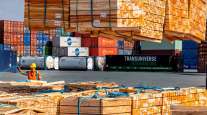In Russia, a Protest Against Putin Rises From an Unlikely Source: Truckers
 Maxim Zmeyev/Reuters
Maxim Zmeyev/ReutersSTUPINO, Russia — Like most Russians, the truck drivers parked up at the Doughnuts roadside cafeteria south of Moscow care little for opposition politics, but a new government policy has made them rethink their attitudes toward Vladimir Putin.
As of last month, the state has started charging a fee for every kilometer that trucks over 12 tonnes in weight (13.2 U.S. tons) drive over Russian roads. Drivers angry at the extra charge have staged protests and go-slows around the country.
Compounding their anger is the fact that the company awarded the contract to collect the fees is co-owned by Igor Rotenberg, son of Putin's judo partner and part of a generation of people close to the Russian president who have acquired fabulous wealth.
At the Doughnuts cafe, 55 miles outside the capital, truckers grumble about Putin. "We vote for him unanimously, and he does this bad stuff to us?" said Vladimir, on a run from the southern city of Volgograd.
The economy is in recession because of low prices of oil, Russia's main export, and Western sanctions imposed over the conflict in Ukraine. The authorities have had to tighten their belt, prompting protests over issues such as car parking fees and hospital closures.
Most of these are divorced from politics: Demonstrators focus on narrow issues, they may blame local officials, but rarely do they target their anger toward Putin or the system he has built during 15 years in power.
Any political protests aimed against Putin's rule tend to be small, restricted to the urban intelligentsia and quickly peter out.
The drivers at the truck stop, most of them dressed in tattered track suits, do not belong to that group. Yet their protests have taken on a political flavor, making them an unusual phenomenon in Putin's Russia.
"Why this Rotenberg character? This person, who is he to us?" asked another driver from Volgograd, who did not give his name. "We don't want a revolution. We don't want things to be like they were in Ukraine," he said. "[But] the state cannot treat people this way."
PUTIN'S FRIENDS
In April 2013, the Russian government opened a tender to find an operator for its new road-charging system. The idea, the government said, was to follow European countries such as Germany in making the heaviest road users contribute most to their upkeep.
After announcing the closure of the bidding, then reopening it, the state roads agency announced in August last year it was scrapping the tender altogether. The following month it said it was in talks to award the contract, without an open competition, to a company called RT-Invest Transport Systems, which had been specially created for the contract.
 Protesting truckers eat inside a trailer. Maxim Zmeyev/Reuters
Protesting truckers eat inside a trailer. Maxim Zmeyev/ReutersAccording to its Internet site, the firm has two co-owners.
One is RT-Invest, a unit of Rostec, a state industrial conglomerate whose chief executive is Sergei Chemezov, a close associate of Putin who is subject to European Union and U.S. sanctions imposed over Russia's intervention in Ukraine.
The other is Igor Rotenberg. He is the son of Arkady Rotenberg, a friend of Putin from his days in Russia's second city of St Petersburg, who also was his regular sparring partner in judo sessions.
Arkady Rotenberg has earned millions of dollars from contracts awarded by state entities, and, with his brother Boris, is subject to U.S. Treasury sanctions imposed over the Ukraine conflict.
Arkady Rotenberg was among dignitaries who played an exhibition hockey game with Putin on his birthday Oct. 7 this year.
Asked if Arkady Rotenberg's relationship with Putin had helped his son win the contract for the road tariff system, Kremlin spokesman Dmitry Peskov said: "No, it didn't help."
He referred other questions about the deal to the transport ministry and the roads agency.
TIDE OF PROTEST
Gauging the scale of the truckers' protest is difficult. They are not organized into a single group, the sector is dominated by small players who often own only one truck and their protests are unannounced and short-lived.
Drivers last month in the southern region of Dagestan formed a column of dozens of trucks that obstructed traffic on a major highway, according to local media. Demonstrations and go-slow protests have been reported in the central regions of Perm and Yekaterinburg, and in Rostov in the South.
Protest leaders have been talking about driving to Moscow and jamming up the capital's ring-road, but that has failed to materialize.
Drivers said the police were listening in to truckers' radio communications and intercepting any vehicles they suspected were heading to a protest.
The government has made some concessions. It has reduced the rate of the tariff to 1.5 rubles ($0.0215) per km, from 3.5 rubles, and also slashed the fines for non-payment.
The protest is unlikely to turn public opinion against Putin. According to Levada Center, an independent pollster, his approval rating is 85%, near its highest level.
Most people see the new tariffs as a problem for truckers only, that does not concern them.
However, the protests could be the beginning of a tide of discontent, as the government cuts social spending and — blocked by sanctions from borrowing on Western financial markets — tries to raise more revenue from citizens.
"In conditions where budget spending is being reduced, injustice, inequality, disparities between the rich and the poor, the powerful and the weak ... will be exposed even more," Levada Center wrote in an analytical note.
"New groups are appearing which recognize their own interests and demand that the authorities take them into account."
(Additional reporting by Maria Tsvetkova and Ludmila Danilova in Moscow; writing by Christian Lowe; editing by David Stamp)




